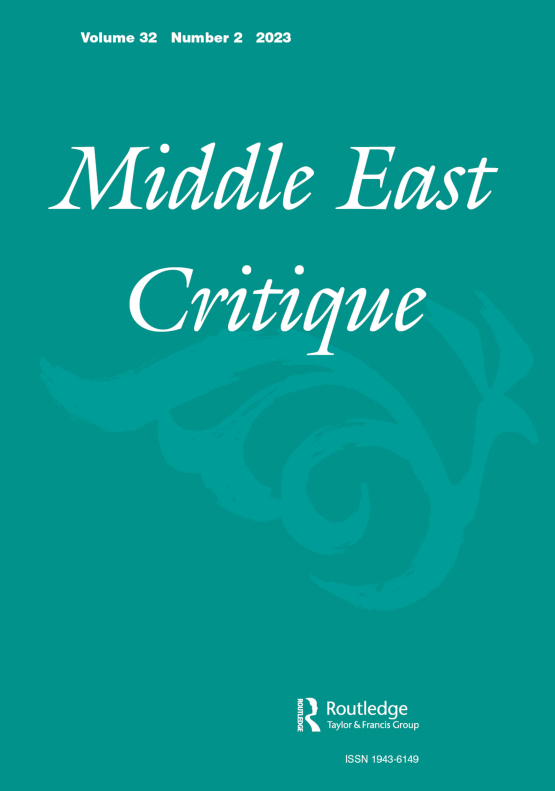Submit a Manuscript to the Journal
Middle East Critique
For a Special Issue on
Contemporary Issues of Capitalism in the Middle East
Abstract deadline
15 February 2024
Manuscript deadline
15 August 2024

Special Issue Editor(s)
Stella Morgana,
University of Liverpool
[email protected]
Kayhan Valadbaygi,
Leiden University
[email protected]
Contemporary Issues of Capitalism in the Middle East
What does the term ‘capitalism’ imply when it is applied to the Middle East and North Africa? For what does ‘capitalism’ stand when it intersects with the most recent forms of neoliberal practices in the region? How do dynamics of class, gender and ethnicity shape contemporary issues of capitalism?
This special issue tackles these questions by exploring the gaps in current mainstream literature, which fails to give a broad perspective on the nuanced nature and developments of late capitalism in the MENA region.
First, most of the academic debate on capitalism in the Middle East has primarily focused on Rentier State Theory and State economy-driven crony capitalism. This emphasis has resulted in two problematic issues: the neglect of the interaction between top-down policies and bottom-up practices, and the reinforcement of the dualism between global/local or international/national dynamics.
Second, mainstream perspectives have overlooked an analysis of class formations in the region, let alone considering the fact that class formation is not a self-standing process, detached from issues of race, ethnicity, and gender. These shortcomings in academic debates can be better understood if linked to the disarticulation of the process of class formation in the region from the historical challenges that emerged in the postcolonial world and late capitalism. In fact, class formation is strictly connected to the capitalist idea of development, which followed trajectories of racialised and gendered exploitation, as well as appropriation of resources.
Third, new surveillance techniques and technologies have often been depicted as perpetuating centuries-old authoritarianism, rather than being recognised as contemporary forms of subjugation within the framework of authoritarian neoliberalism and as mechanisms of late global capitalism. Moreover, gig work has been mainly analysed through the prism of employment opportunities and digital development, overlooking dynamics of labour exploitation, migration issues and feminist forms of resistance/empowerment.
Fourth, geopolitical tensions have been notably absent from analyses of capitalist development in the region. This separation between military-security concerns and political economy has led to the examination of geopolitical tensions and military interventions by Middle Eastern regional powers solely through the perspectives of deterrence, regional hegemonic ambitions, or sectarian conflicts between Saudi Arabia and its allies and Iran with its proxies in the ‘Shia-crescent’. Moreover, these geopolitical tensions have seldom been connected to the new and more recent geopolitical disputes among global power centres (including the United States, the European Union, China, and Russia).
Fifth, Orientalist and Eurocentric narratives have permeated the debate on environmental issues and climate change, by blaming natural factors or local mismanagement instead of focusing on the exploitation of human and natural resources in the context of global capitalism.
Drawing upon the burgeoning critical political economy literature on capitalism in the MENA, this special issue will navigate the motions and tendencies of global capitalism, shuffling through a three-fold dimension: the local, the regional and the global. With this conceptual and methodological approach, we call for papers that broaden the analysis both from a theoretical and an empirical perspective.
We seek to provide an inclusive and diverse forum for a broader community of scholars, in terms of gender, background and career stage with the aim of bringing together multi-disciplinary insights and approaches from politics, political economy, Middle Eastern studies and development studies. Proposals from ECRs and scholars from the region are particularly encouraged.
The Special Issue will explore the following themes through comprehensive case studies, with each case study focusing on one country or a sub-region within the MENA.
Topics of interest include, but are not limited to:
- Reconfiguration of class formations and their intersections with gender, race/ethnicity, and sexuality. Theoretical analyses / historical accounts / ethnographies reflecting on the challenges that emerged in the postcolonial world and late capitalism, moving beyond the mainstream literature overlooking exploitative dynamics in the analyses of development in the region.
- Labour, surveillance, and gig economy. Critical approaches to platform work in the region and surveillance technologies within the context of global capitalism.
- Imperialism and regional geopolitical conflicts. Analyses that connect geopolitical acrimonies to the processes of capitalist development in the region and the global economy as well as rising tesntions among global power centres (United States, the European Union, China, and Russia).
- Environmental issues and climate change. Alternative perspectives on the tropes of looming wars due to climate changes, which are often framed within the boundaries of emergency and scarcity-induced ‘water conflicts’.
- Interdisciplinary and theoretically innovative approaches to capitalist developments in the MENA region within the context of the transformations in global capitalism, understood as a result of the financial crisis of 2008 and the COVID-19 pandemic.
Looking to Publish your Research?
Find out how to publish your research open access with Taylor & Francis Group.
Choose open accessSubmission Instructions
Interested authors should submit a 300-word abstract by email to the journal’s Editor, Dr Matteo Capasso, at [email protected] and to the Guest Editors, Dr Stella Morgana at [email protected] and Dr Kayhan Valadbaygi at [email protected].
We aim for a special issue of 7-9 original articles, preceded by an introduction by the editors.
Selected authors are expected to submit an original article of 8000-9000 words.
ABSTRACT DEADLINE
15 February 2024
MANUSCRIPT DEADLINE
15 August 2024